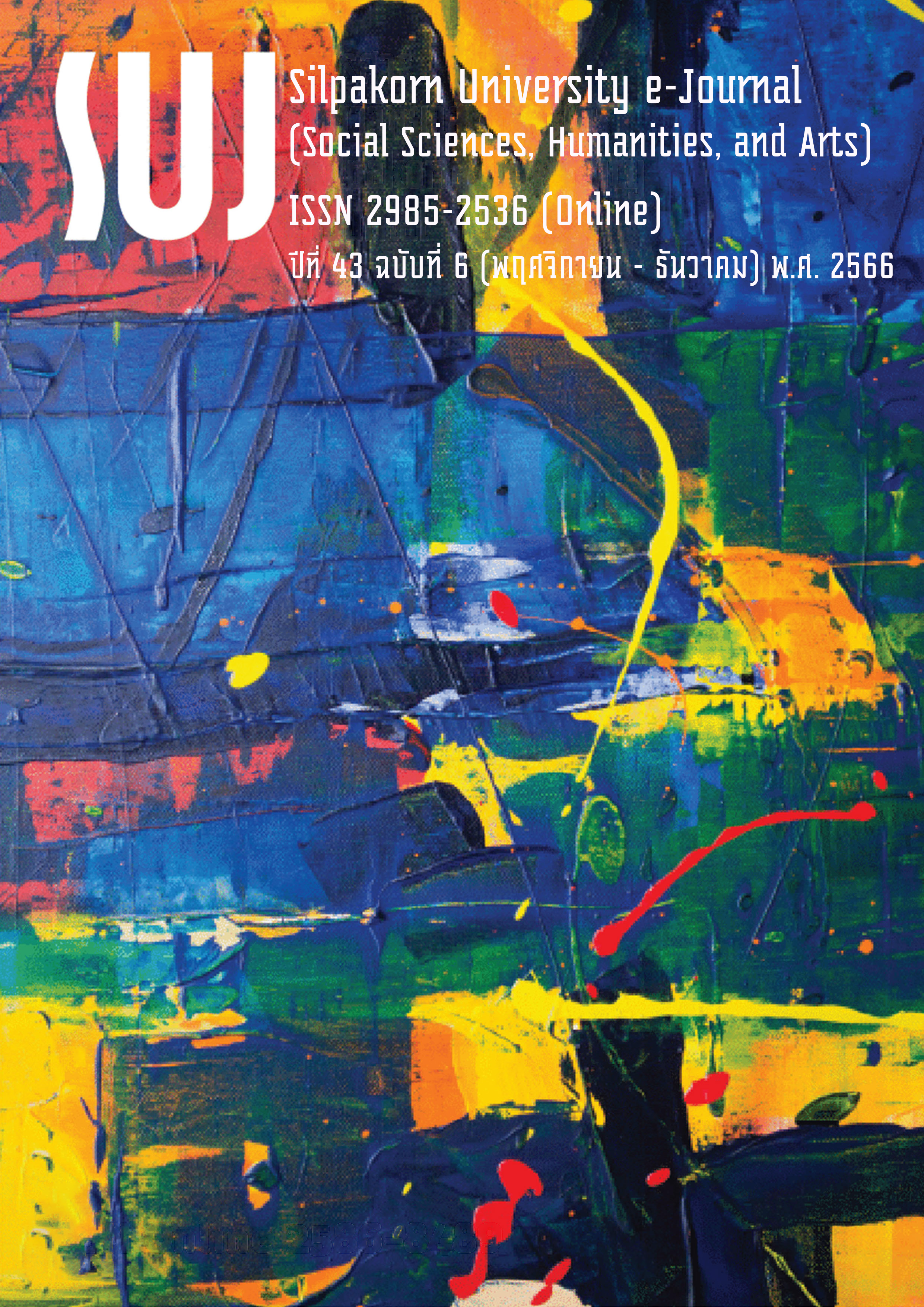การพัฒนารูปแบบการสอนตามทฤษฎีเชื่อมโยงความรู้ร่วมกับแนวคิดการใช้ปรากฏการณ์เป็นฐานเพื่อส่งเสริมคุณลักษณะความเป็นพลเมืองเข้มแข็งและทักษะการรู้เท่าทันสื่อของนักศึกษาในระดับอุดมศึกษา (The development of an instructional model for enhancing active citizenship and media literacy skills of undergraduate students through connectivism theory and phenomenon-based learning)
Main Article Content
Abstract
การวิจัยนี้มีวัตถุประสงค์เพื่อ 1) พัฒนารูปแบบการสอนตามทฤษฎีเชื่อมโยงความรู้ร่วมกับแนวคิดการใช้ปรากฏการณ์เป็นฐานเพื่อส่งเสริมคุณลักษณะความเป็นพลเมืองเข้มแข็งและทักษะการรู้เท่าทันสื่อของนักศึกษาในระดับอุดมศึกษาให้มีคุณภาพและประสิทธิภาพ และ 2) ประเมินประสิทธิผลการใช้รูปแบบการสอนตามทฤษฎีเชื่อมโยงความรู้ร่วมกับแนวคิดการใช้ปรากฏการณ์เป็นฐานเพื่อส่งเสริมคุณลักษณะความเป็นพลเมืองเข้มแข็งและทักษะการรู้เท่าทันสื่อของนักศึกษาในระดับอุดมศึกษา กลุ่มตัวอย่าง ได้แก่ นักศึกษาที่ลงทะเบียนเรียนรายวิชาพลเมืองศึกษา ภาคเรียนที่ 1 ปีการศึกษา 2564จำนวน 34 คน เครื่องมือที่ใช้ในการวิจัย ประกอบด้วย รูปแบบการสอน แผนการจัดการเรียนรู้ และเครื่องมือประเมินประสิทธิผลการใช้รูปแบบการสอน ทำการวิเคราะห์ข้อมูลโดยการหาค่าเฉลี่ย (X̅) ส่วนเบี่ยงเบนมาตรฐาน (S.D.) การวิเคราะห์อนุกรมเวลา และการวิเคราะห์เนื้อหา ผลการวิจัย พบว่า 1) รูปแบบการสอนที่พัฒนาขึ้น ทั้ง 6 องค์ประกอบ ได้แก่ 1.1) หลักการ 1.2) วัตถุประสงค์ 1.3) ขั้นตอนการสอน มี 6 ขั้นตอน ประกอบด้วย การสร้างความเข้าใจให้แก่ผู้เรียนการเชื่อมโยงความรู้ด้วยปรากฏการณ์ การเสาะแสวงหาความรู้ การออกแบบกิจกรรมหรือโครงร่าง การดำเนินการตามกิจกรรมหรือโครงการ และการประเมินผลการเรียนรู้ 1.4) ระบบสังคม 1.5) ระบบสนับสนุน และ 1.6) การวัดและประเมินการเรียนรู้ มีความเหมาะสมและสอดคล้องเชิงโครงสร้างสามารถนำไปทดลองใช้และนำไปจัดการเรียนการสอนได้ และ 2) เมื่อประเมินประสิทธิผลการใช้รูปแบบการสอนตามทฤษฎีเชื่อมโยงความรู้ร่วมกับแนวคิดการใช้ปรากฏการณ์เป็นฐานเพื่อส่งเสริมคุณลักษณะความเป็นพลเมืองเข้มแข็งและทักษะการรู้เท่าทันสื่อของนักศึกษาในระดับอุดมศึกษา พบว่า นักศึกษามีพัฒนาการคุณลักษณะความเป็นพลเมืองเข้มแข็งและทักษะการรู้เท่าทันสื่อในภาพรวมเพิ่มขึ้นอย่างต่อเนื่องอยู่ในระดับมาก ผลการวิจัยจะเป็นแนวทางในการจัดการเรียนรู้อย่างเป็นระบบและมีขั้นตอนการสอนที่ชัดเจนเพื่อส่งเสริมคุณลักษณะความเป็นพลเมืองเข้มแข็งและทักษะการรู้เท่าทันสื่อ ซึ่งจะช่วยให้การจัดการเรียนรู้มีประสิทธิภาพมากยิ่งขึ้น
The purposes of this research were to: 1) develop an instructional model based on connectivism theory and phenomenon-based learning to enhance the quality and effectiveness of active citizenship and media literacy skills of undergraduate students and 2) evaluate the effectiveness of the instructional model grounded in connectivism theory and phenomenon-based learning to enhance characteristics of active citizenship and media literacy skills of undergraduate students. The sample consisted of 34 undergraduate students who enrolled in a Civic Education class during the first semester of the academic year 2021. The research instruments included the instructional model, lesson plans, and instructional model effectiveness evaluation forms. Quantitative data were analyzed using mean, standard deviation, and repeated measures ANNOVA, while the qualitative data were analyzed using content analysis. The research findings were as follows: 1) the instructional model consisted of six components: 1.1) Principles 1.2) Objectives 1.3) Instructional process consisting of six steps as follow: creating mutual understanding, interconnecting with phenomenon, verifying obtained information, initiating activity or project, conducting designed activity or project, and evaluating and disseminating 1.4) social system 1.5) support system and 1.6) evaluation and assessment; 2) The effectiveness of the instructional model based on connectivism theory and phenomenon-based learning to enhance the characteristics of active citizenship and media literacy skills of undergraduate students. The results revealed that the students continuously developed their overall active citizenship and media literacy skills at a high level. The research findings will serve as guidelines for systematic and clearly defined teaching processes to promote active citizenship qualities and media literacy skills. This will enable more effective learning management.
Downloads
Article Details

This work is licensed under a Creative Commons Attribution-NonCommercial-NoDerivatives 4.0 International License.
References
Akkaprasa, Praewpan. (2014). Concepts and Theories of Media Literacy (แนวคิดและทฤษฎีการรู้เท่าทันสื่อ). In T. Sukwong, C. Nutakom, K. Palmoke, & S. Taikham (Eds.), Media Literacy, (pp. 59-80). [Online]. Retrieved June 21, 2020 from http://bcp.nbtc.go.th/uploads/items/attachments/b7bb35b9c6ca2aee2df08cf09d7016c2/_651dab51d77cc9cc0b46de8a418db8e7.pdf
Announcement of the Ministry of Education on Higher Education Standards B.E. 2561 (ประกาศกระทรวงศึกษาธิการ เรื่อง มาตรฐานการอุดมศึกษา พ.ศ. 2561). (2018, August 17). Royal Thai Government Gazette (No. 135 Special Chapter 199 d, pp.19-21). [Online]. Retrieved April 12, 2020 from http://www.ratchakitcha.soc.go.th/DATA/PDF/2561/E/199/T19.PDF
Bureau of Academic Affairs and Educational Standards, Office of the Basic Education Commission. (2019). The Report of Training Course Science Education for Science and Mathematically Gifted Learner the Normal Lyceum of Helsinki, Faculty of Behavioral Sciences in University of Helsinki (รายงานการอบรมหลักสูตร Science Education for Science and Mathematically Gifted Learner The Normal Lyceum of Helsinki, Faculty of Behavioral Sciences in University of Helsinki). [Online]. Retrieved April 12, 2020 from https://www.obec.go.th/archives/109179
Butkatunyoo, Oraphan. (2018). Phenomenon based learning for developing a learner’s holistic views and engaging in the real world (การเรียนรู้โดยใช้ปรากฏการณ์เป็นฐานเพื่อการสร้างมุมมองแบบองค์รวมและการเข้าถึงโลกแห่งความจริงของผู้เรียน). Journal of Education Studies, 46(2): 348-365.
Hongkhunthod, Anusorn. (2015). Self-Knowledge Costruction through Connectivism Theory (การสร้างความรู้ด้วยตนเองจากการเชื่อมต่อ (connectivism)). Technosan, 6(6-7): 24-27.
Khammanee, Tissana. (2018). Science of Teaching: Knowledge for Effective Learning Organization (ศาสตร์การสอน : องค์ความรู้เพื่อการจัดกระบวนการเรียนรู้ที่มีประสิทธิภาพ) (22nd ed.). Bangkok: Chulalongkorn University Press.
Kilbane, C. R., & Milman, N. B. (2014). Teaching Models: Designing Instruction for 21st Century Learners. Boston, MA: Pearson.
Kruse, K. (2008). Introduction to Instructional Design and the ADDIE Model. [Online]. Retrieved April 9, 2020 from https://portal.ct.gov/-/media/CTDN/TtT2015/ttt2015module5IntroInstDesignADDIEpdf.pdf
Mahavijit, Pongsatorn. (2017). Innovative learning from Finland (นวัตกรรมการเรียนรู้จากฟินแลนด์). IPST Magazine, 46(209): 40-45.
Maitaouthong, Therdsak. (2014). Media literacy: Skill for 21st century learning (การรู้เท่าทันสื่อ: ทักษะสำหรับการเรียนรู้ในศตวรรษที่ 21). Journal of Information Science, 32(3): 74-91.
Makesrithongkum, Bubpha. (2011). Media literacy: Keeping pace with information age (การรู้เท่าทันสื่อ: การก้าวทันบนโลกข่าวสาร). Executive Journal, 31(1): 117-123.
Nillapun, Maream. (2015). Research Methodology in Education (วิธีวิจัยทางการศึกษา) (9th ed.). Nakhon Pathom: Silpakorn University Printing House.
Niranthawee, Sakchai. (2005). Learning Management for Developing Students to be Good Citizens (Research report) (การจัดการเรียนรู้เพื่อพัฒนาผู้เรียนให้เป็นพลเมืองดี) (รายงานวิจัยเอกสาร). Bangkok: Pimdee.
Office of the Education Council, Ministry of Education. (2017). The National Education Plan B.E. 2560-2579 (แผนการศึกษาแห่งชาติ พ.ศ. 2560-2579). Bangkok: Prikwarn Graphic.
Sirithanyarat, Chintana, & Laowreandee, Watchara. (2019). Instructional System Design (การออกแบบระบบการเรียนการสอน) (2nd ed.). Nakhon Pathom: Silpakorn University Printing House.
Tunhikorn, Bupphachart. (2012). Developing Students’ Characteristic in the New Era for the Second Education Reform Insurance by Integrating ICT in Project-based Learning Management (Research Report) (การพัฒนาคุณลักษณะผู้เรียนยุคใหม่เพื่อรองรับการปฏิรูปการศึกษาในทศวรรษที่สอง ด้วยการบูรณาการไอซีทีในการจัดการเรียนรู้ด้วยโครงการ) (รายงานวิจัย). Bangkok: Office of the Education Council.
Vanichwatanavorachai, Siriwan. (2016). Method of Teaching (วิธีสอนทั่วไป) (2nd ed.). Nakhon Pathom: Silpakorn University Printing House.
Wilson, C., Grizzle, A., Tuazon, R., Akyempong, K., & Cheung, C.-K. (2011). Media and Information Literacy Curriculum for Teachers. Paris: UNESCO. [Online]. Retrieved September 20, 2021 from https://unesdoc.unesco.org/ark:/48223/pf0000192971
Yenjabok, Porntip. (2009). Decrypting Ideas for Media Literacy: Media Literacy Learning Guide (ถอดรหัส ลับความคิด เพื่อการรู้เท่าทันสื่อ: คู่มือการเรียนรู้เท่าทันสื่อ). Bangkok: Offset Creation.


